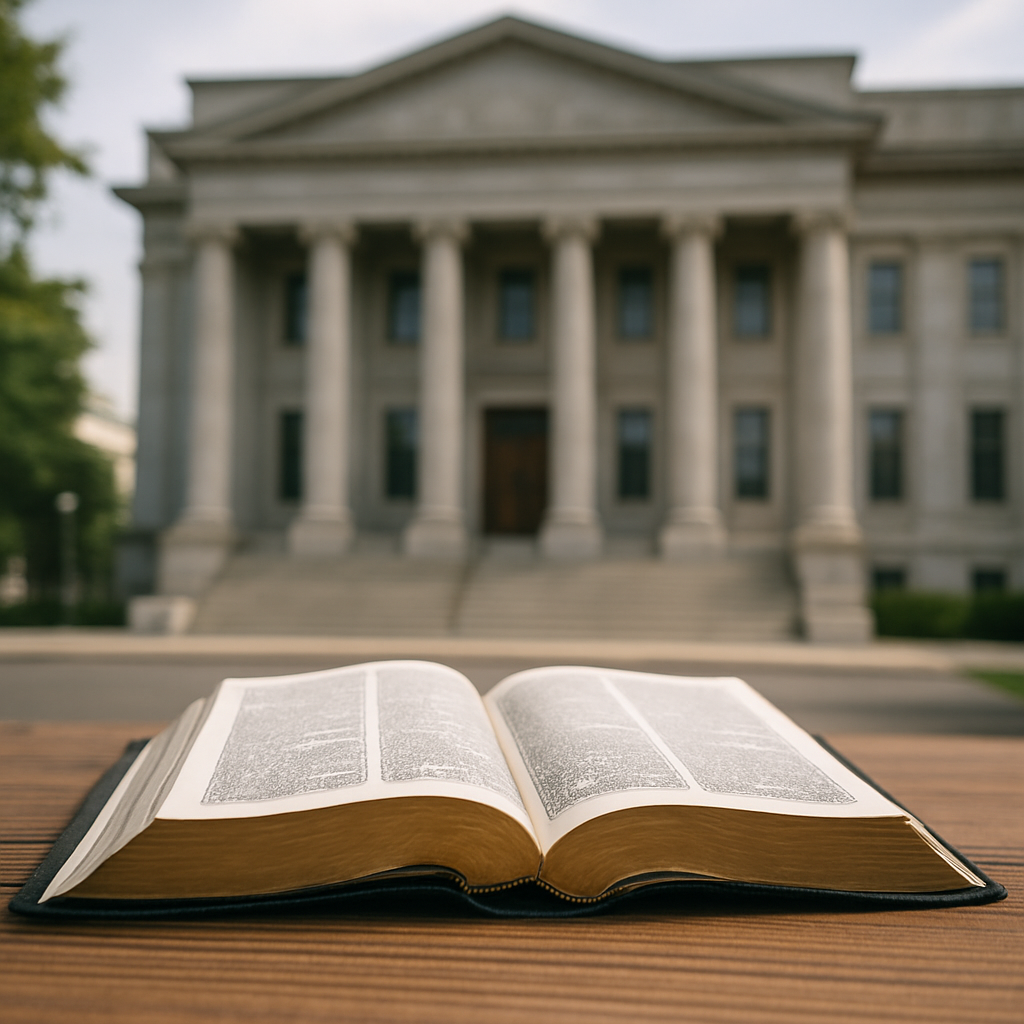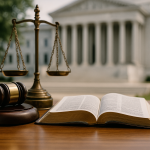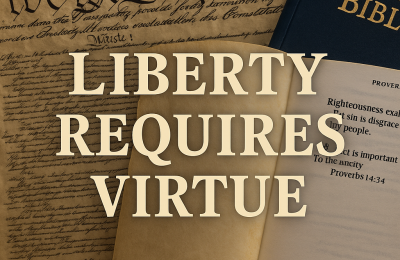Series: The Church and Public Policy
Scripture Focus: Galatians 5:1
On a Sunday morning in Beijing, a small group of Christians gathers quietly in an apartment. The curtains are drawn. A single Bible sits in the center of the table. They sing in whispers, knowing the wrong knock at the door could mean arrest. Thousands of miles away, in small-town America, another group of believers drives openly to church, coffee in hand, worship music filling the airwaves. The same gospel is preached in both places but one gathers under threat, the other in freedom.
What explains the difference? And more importantly, what kind of freedom really matters?
For many Americans, “religious freedom” sounds like a constitutional right, guaranteed by the First Amendment and defended by the courts. And yes, that protection matters. Just this year, the U.S. Supreme Court ruled in favor of Catholic Charities in Wisconsin, affirming that faith-based organizations cannot be punished for living out their beliefs while serving their communities. Cases like that remind us that freedom of conscience is precious.
But the Bible pushes us deeper. Long before Jefferson wrote to the Danbury Baptists or Madison drafted the Bill of Rights, Paul wrote to the Galatians: “For freedom Christ set us free; therefore stand firm and do not be subject again to a yoke of slavery” (Gal. 5:1). Freedom begins not with government, but with the gospel. The question for Christians is not merely whether Caesar will allow us to worship, but whether we are using our freedom in Christ to stand firm.
Paul’s declaration in Galatians 5:1 is one of the boldest statements of Christian liberty in the New Testament:
“For freedom Christ set us free; therefore stand firm and do not be subject again to a yoke of slavery.” (Gal. 5:1, LSB)
The immediate context is spiritual, not political. The Galatians were tempted to add the yoke of the Mosaic law circumcision and ritual obligations—as a condition of righteousness. Paul warns them that such legalism is not just a small mistake; it is a surrender of the very gospel. To add law to grace is to return to slavery.
Freedom Defined
Biblical freedom is not the absence of restraint, nor the license to do whatever we please. Jesus makes this plain in John 8:36: “So if the Son makes you free, you will be free indeed.” True freedom is liberation from sin’s dominion and the curse of the law. It is the ability to joyfully obey God, not the excuse to indulge self.
This is crucial: freedom is always freedom unto something. The modern West often defines freedom as radical autonomy “my truth,” “my body,” “my choice.” But Scripture defines freedom as the glad ability to live as God designed. Liberty is found not in rejecting His authority, but in being restored to it.
Freedom’s Public Implications
When Paul speaks of Christian freedom, he is not thinking of the Bill of Rights. Yet the principle reverberates into the public square. If every believer is accountable to Christ alone, then no government may rightly intrude upon conscience. As Peter told the authorities in Acts 4:19, “Whether it is right in the sight of God to listen to you rather than to God, you be the judge.” Religious freedom, in its deepest sense, is simply the recognition of God’s higher claim on the human heart.
This is why Christian thinkers through the centuries from Augustine to Luther to Kuyper have insisted that liberty of conscience is not a political invention but a divine necessity. Abraham Kuyper, the Dutch Prime Minister and theologian, famously said, “There is not a square inch in the whole domain of our human existence over which Christ, who is Sovereign over all, does not cry, ‘Mine!’” If Christ claims all, then no earthly ruler can claim the believer’s worship.
Freedom Guarded
Paul’s warning in Galatians is urgent: “Stand firm.” Freedom in Christ can be lost, not in the sense of losing salvation, but in surrendering to new forms of bondage. For the Galatians, it was the bondage of legalism. For us, it might be the bondage of cultural pressure, state coercion, or even the subtle idol of comfort. The call is the same: stand firm.
Religious freedom, then, is not primarily about what courts permit, but about how Christians live. Do we stand firm in the liberty Christ has given, or do we slip back into slavery, whether of sin, of fear, or of state-imposed conformity?
The headlines remind us almost weekly: religious freedom is not a settled issue. It is contested ground.
Consider the 2025 Supreme Court case Catholic Charities v. Wisconsin. The state attempted to strip Catholic Charities of a tax exemption because its work was explicitly grounded in religious conviction, even though the ministry served all people, regardless of faith. In a unanimous decision, the Court ruled in favor of the ministry, affirming that government cannot penalize an organization simply because it is motivated by faith.
Why does a case like this matter? Because it illustrates that religious liberty is not about privilege, it is about principle. Catholic Charities was not asking for special treatment; it was asking for equal protection. It was not demanding the state endorse its beliefs, only that it be free to serve the community in Christ’s name without compromise.
This is the kind of liberty Christians must defend: not the liberty to dominate, but the liberty to obey Christ. When religious freedom is weakened, it does not silence churches alone. It shrinks the public square and narrows the avenues of compassion. If ministries cannot serve openly as Christians, then communities suffer, and the gospel witness is muted.
At the same time, we must remember the distinction. The Constitution can protect freedom of worship, but it cannot create it. Courts can safeguard religious exercise, but they cannot grant the liberty Paul proclaims in Galatians 5:1. Governments may defend or deny rights, but only Christ breaks the chains of sin.
This means two things for believers today:
- We should be grateful for civil protections of conscience. A world where Christians are free to preach, serve, and disciple openly is a blessing. We should not take it for granted.
- We should be ready to endure if those protections erode. Our brothers and sisters in underground churches remind us that freedom in Christ does not depend on Caesar’s permission.
The temptation in the American context is to confuse the Bill of Rights with the Beatitudes—to think that losing legal protections is the same as losing gospel power. It is not. Religious freedom matters deeply, but it is not ultimate. Christ is ultimate.
Religious liberty debates can feel abstract court cases, constitutional clauses, legal jargon. But Paul’s warning in Galatians 5:1 presses the issue into the heart: “Stand firm.” Freedom in Christ is not only something to defend in society; it is something to practice in discipleship.
So what does that look like on Monday morning?
First, it means using freedom rightly. Paul reminds us in 1 Peter 2:16, “[Live] as free people, and do not use your freedom as a covering for evil, but use it as slaves of God.” Spiritual liberty is not license. It is not the freedom to indulge sin but the freedom to walk in holiness. Every time we use our liberty to justify selfishness, we trade Christ’s gift for another yoke of slavery.
Second, it means courage to confess Christ openly. In a culture that increasingly pressures believers to privatize their faith—“believe whatever you want, but don’t bring it into the public square” standing firm requires conviction. Freedom in Christ empowers us to speak truth in love, whether at work, in school, or in conversations with neighbors. We are free to live unashamed of the gospel (Rom. 1:16).
Third, it means defending freedom for others. Christians should be the first to insist that no one—whether believer, skeptic, or seeker—should be coerced in matters of conscience. Why? Because coerced worship is no worship at all. Protecting liberty is not about preserving privilege; it is about honoring the way God made humanity: accountable ultimately to Him.
Standing firm, then, is not just about what the courts decide, it is about how disciples live. Do we walk daily in the freedom Christ has won, or do we drift back into chains of fear, silence, or compromise?
Freedom in Christ is both a gift and a calling. The challenge before us is simple but costly: stand firm.
This week, resist the temptation to privatize your faith. Pray before your meal in public. Mention Christ naturally in conversation. Share Scripture with a coworker who is struggling. Use your freedom not to hide, but to witness.
Second, pay attention to the headlines, but don’t panic. When you see stories about religious liberty cases like Catholic Charities v. Wisconsin, let them remind you to pray for those on the front lines. But don’t let anxiety rule you. Christ has already secured the freedom that no government can take away.
Finally, disciple someone else into courage. Talk with your children or a younger believer about why freedom matters—not just politically, but spiritually. Help them see that standing firm for Christ is worth more than comfort, reputation, or approval.
The world may narrow the space for Christian conviction, but the gospel will never be chained. Use your liberty well.
Series Navigation
- Previous Series (July): Technology & Ethics: A Biblical Worldview for the Digital Age
- Next Post (Aug 12): The Role of Government in God’s Plan (Romans 13:1–2)
- View All: Facing the Issues: A Christian Worldview for a Confused Age
Takeaway Truths
- Freedom begins in Christ. Political liberty is valuable, but spiritual liberty is eternal.
- Religious freedom protects gospel witness. Defending conscience is not about privilege but about making space for Christ to be proclaimed.
- Stand firm. Do not trade your liberty in Christ for legalism, fear, or silence.
Live it out. Share the truth. Walk with courage.








